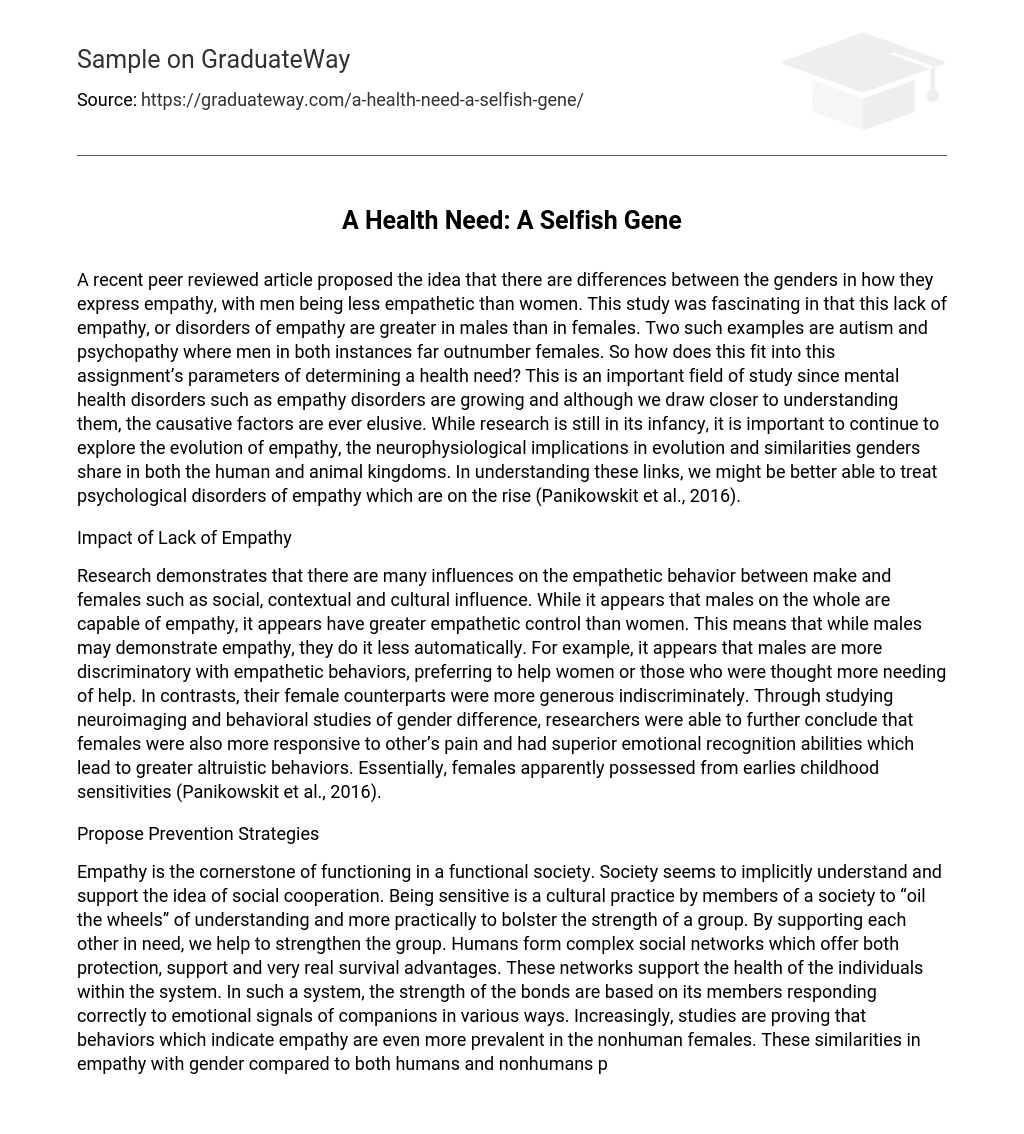A recent peer reviewed article proposed the idea that there are differences between the genders in how they express empathy, with men being less empathetic than women. This study was fascinating in that this lack of empathy, or disorders of empathy are greater in males than in females. Two such examples are autism and psychopathy where men in both instances far outnumber females. So how does this fit into this assignment’s parameters of determining a health need? This is an important field of study since mental health disorders such as empathy disorders are growing and although we draw closer to understanding them, the causative factors are ever elusive. While research is still in its infancy, it is important to continue to explore the evolution of empathy, the neurophysiological implications in evolution and similarities genders share in both the human and animal kingdoms. In understanding these links, we might be better able to treat psychological disorders of empathy which are on the rise (Panikowskit et al., 2016).
Impact of Lack of Empathy
Research demonstrates that there are many influences on the empathetic behavior between make and females such as social, contextual and cultural influence. While it appears that males on the whole are capable of empathy, it appears have greater empathetic control than women. This means that while males may demonstrate empathy, they do it less automatically. For example, it appears that males are more discriminatory with empathetic behaviors, preferring to help women or those who were thought more needing of help. In contrasts, their female counterparts were more generous indiscriminately. Through studying neuroimaging and behavioral studies of gender difference, researchers were able to further conclude that females were also more responsive to other’s pain and had superior emotional recognition abilities which lead to greater altruistic behaviors. Essentially, females apparently possessed from earlies childhood sensitivities (Panikowskit et al., 2016).
Propose Prevention Strategies
Empathy is the cornerstone of functioning in a functional society. Society seems to implicitly understand and support the idea of social cooperation. Being sensitive is a cultural practice by members of a society to “oil the wheels” of understanding and more practically to bolster the strength of a group. By supporting each other in need, we help to strengthen the group. Humans form complex social networks which offer both protection, support and very real survival advantages. These networks support the health of the individuals within the system. In such a system, the strength of the bonds are based on its members responding correctly to emotional signals of companions in various ways. Increasingly, studies are proving that behaviors which indicate empathy are even more prevalent in the nonhuman females. These similarities in empathy with gender compared to both humans and nonhumans points to similar biological roots rather than cultural expectations of gender. This review of literature was quite surprising in that there appears to be hard evidence that each gender appears to be “hard- wired” differently (Panikowskit et al., 2016).
Summarize Findings and Proposals
From this review of literature, there appears to be a phylogenetic and ontogenetic causes of variable empathetic behavior between the sexes. So in order to solve the mental health disorders due to lack of empathy, more work needs to be done regarding the pathophysiology of these diseases. However, further research may help us to deepen our understanding of the evolution advantages or contextual factors affecting male empathy. Some areas which may be explored include exploring the empathetic behaviors of male caregivers.
References
- Ponikowski,,V., Voors, A., Anker, S.D. et al. (2016). Empathy: Gender effects in brain and behavior. Neuroscience. 37(27). 2129–2200. doi: 10.1093/eurheartj/ehw128





